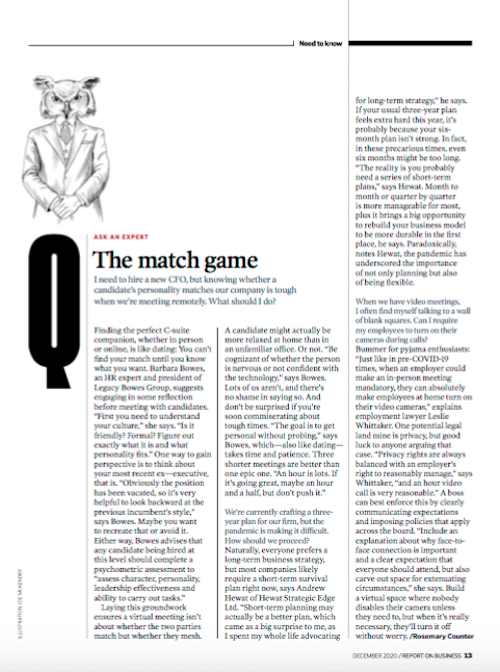The Match Game
Report on Business: Ask an Expert
I need to hire a new CFO, but knowing whether a candidate’s personality matches our company is tough when we’re meeting remotely. What should I do?
Finding the perfect C-suite companion, whether in person or online, is like dating: You can’t find your match until you know what you want. Barbara Bowes, an HR expert and president of Legacy Bowes Group, suggests engaging in some reflection before meeting with candidates. “First you need to understand your culture,” she says. “Is it friendly? Formal? Figure out exactly what it is and what personality fits.” One way to gain perspective is to think about your most recent ex-executive, that is. “Obviously the position has been vacated, so it’s very helpful to look backward at the previous incumbent’s style,” says Bowes. Maybe you want to recreate that or avoid it. Either way, Bowes advises that any candidate being hired at this level should complete a psychometric assessment to “assess character, personality, leadership effectiveness and ability to carry out tasks.”
Laying this groundwork ensures a virtual meeting isn’t about whether the two parties match but whether they mesh. A candidate might actually be more relaxed at home than in an unfamiliar office. Or not. “Be cognizant of whether the person is nervous or not confident with the technology,” says Bowes. Lots of us aren’t, and there’s no shame in saying so. And don’t be surprised if you’re soon commiserating about tough times. “The goal is to get personal without probing,” says Bowes, which—also like dating—takes time and patience. Three shorter meetings are better than one epic one. “An hour is lots. If it’s going great, maybe an hour and a half, but don’t push it.”
We’re currently crafting a three-year plan for our firm, but the pandemic is making it difficult. How should we proceed?
Naturally, everyone prefers a long-term business strategy, but most companies likely require a short-term survival plan right now, says Andrew Hewat of Hewat Strategic Edge Ltd. “Short-term planning may actually be a better plan, which came as a big surprise to me, as I spent my whole life advocating for long-term strategy,” he says. If your usual three-year plan feels extra hard this year, it’s probably because your six-month plan isn’t strong. In fact, in these precarious times, even six months might be too long. “The reality is you probably need a series of short-term plans,” says Hewat. Month to month or quarter by quarter is more manageable for most, plus it brings a big opportunity to rebuild your business model to be more durable in the first place, he says. Paradoxically, notes Hewat, the pandemic has underscored the importance of not only planning but also of being flexible.
When we have video meetings, I often find myself talking to a wall of blank squares. Can I require my employees to turn on their cameras during calls?
Bummer for pyjama enthusiasts: “Just like in pre-COVID-19 times, when an employer could make an in-person meeting mandatory, they can absolutely make employees at home turn on their video cameras,” explains employment lawyer Leslie Whittaker. One potential legal land mine is privacy, but good luck to anyone arguing that case. “Privacy rights are always balanced with an employer’s right to reasonably manage,” says Whittaker, “and an hour video call is very reasonable.” A boss can best enforce this by clearly communicating expectations and imposing policies that apply across the board. “Include an explanation about why face-to-face connection is important and a clear expectation that everyone should attend, but also carve out space for extenuating circumstances,” she says. Build a virtual space where nobody disables their camera unless they need to, but when it’s really necessary, they’ll turn it off without worry.
